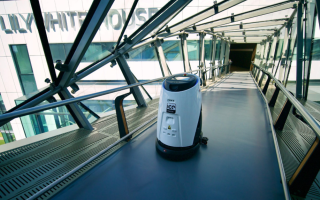One of the biggest and most common annoyances associated with communal office kitchens is the all-too-familiar problem of colleagues neglecting to clean up after themselves, often leaving used dishes and tupperware piled up in the shared kitchen sink.
If your office has invested in a dishwasher for the kitchen space, you could be forgiven for assuming that this problem is a thing of the past – however, office dishwashers come with plenty of their own pitfalls if they aren’t properly maintained with office kitchen cleaning rules.
Read on for a look at the main rules to live by for office dishwasher maintenance, as well as a look at the best cleaning practices to keep your communal dishwasher in great condition.
Always rinse first
Make sure that everyone who uses the dishwasher knows to rinse their used dishes, mugs, cups, Tupperware and cutlery before putting them into the dishwasher – this is one of the main office kitchen rules.
While this may seem fairly common sense, not everyone knows about the harmful effects that putting plates with even the smallest amounts of leftover food on them into the dishwasher.
Not only will leftover food residue generally spread during the cycle and prevent the rest of the crockery and cutlery within the dishwasher from being thoroughly cleaned, but this residue will build up over time and eventually clog the dishwasher.
If this happens, you could be facing costly repairs and may need the dishwasher replacing completely.
With this in mind, ensure that everyone in the workplace is rinsing their crockery and cutlery before loading it into the dishwasher to prevent issues down the line – consider adding this to a list of dishwasher rules in the office.
Unload the dishwasher after each cycle
When you’ve finished the cycle, ensure the dishwasher unit is completely emptied.
If your clean plates are left in the dishwasher for hours after use, you risk a member of staff mistaking them for dirty plates and putting their own unwashed crockery into the dishwasher with them by mistake, which is why office kitchen rules need to be implemented.
Making sure that unloading takes place quickly will help keep a clean workload while also preventing wasted energy, since clean items will not be washed multiple times.
A good way to ensure that this is taken care of is to create a rota for team members, with a different member of staff responsible for emptying the dishwasher each day.
Prevent staff from overloading the dishwasher
With so many team members using the dishwasher after their lunch hour, chances are that it may become overloaded – an example of bad office dishwasher etiquette.
If too many items are crammed into the dishwasher at once, the cycle won’t run correctly and could lead to items needing to be rewashed – again, a waste of both time and energy.
To prevent this scenario, ensure that team members are leaving items that won’t fit into the dishwasher on the counter or in the sink and simply run an extra cycle wherever needed.
Check the dishwasher at the end of each day
It’s never nice to discover that dirty plates have been left in the dishwasher overnight or – even worse – over the weekend, as this could lead to some nasty smells within the shared kitchen.
To prevent this from occurring, designate a member of staff to ensure that the dishwasher is empty at the end of each day.
How to clean a dishwasher
With the dishwasher being used so frequently, it’s likely that dirt and grime will begin to build up fairly quickly.
For this reason, it’s important to ensure that your dishwasher is cleaned thoroughly at least once a month is a focal point of your dishwasher rules in the office.
Cleaning the unit thoroughly requires the dishwasher to be flushed and for the filter and drain to be cleaned.
How to flush a dishwasher
- To flush your dishwasher, fill a dishwasher-safe cup or bowl with 250ml of white vinegar and place this face up on the dishwasher’s shelf.
- Then, run the dishwasher on a hot, empty cycle.
- While a thorough cleaning should be carried out once a month, this step is best completed at least each two weeks to keep your unit as clean as possible.
How to clean dishwasher filter
The filter is the part of the dishwasher where the bulk of any residue and debris builds up, so it’s important that you clean it properly.
- To clean your filter, remove your dishwasher rack and locate the filter unit, unlocking this and unscrewing the filter carefully.
- Place all filter parts under running water to clean away any residue, using a small, soft brush to remove any excess debris that aren’t washed away after rinsing. Ensure you don’t use anything that could damage the filter.
- Following this, you can reassemble all filter parts and place them back in the dishwasher.
How often should you clean your dishwasher?
Depending on how frequently the dishwasher is used, you should frequently carry out dishwasher cleaning.
- Daily cleaning: Remove bits of food inside the dishwasher
- Weekly cleaning: Wipe down the door, gasket and clean the filter
- Monthly cleaning: Deep clean
- As needed: Clean the exterior and buff to ensure the machine looks good and works properly
Corporate contract cleaning with Samsic UK
Samsic UK provides efficient and high-quality facilities management services to clients in a range of sectors, including corporate, healthcare, education and construction.
Our services are fully bespoke and each one is tailored to meet the particular specifications of the client. We make it our responsibility to work with firms throughout the UK, delivering corporate cleaning solutions to the highest possible standards.
We also provide reception, security, and maintenance solutions, amongst a range of other services. For more information, get in touch with Samsic UK today.








